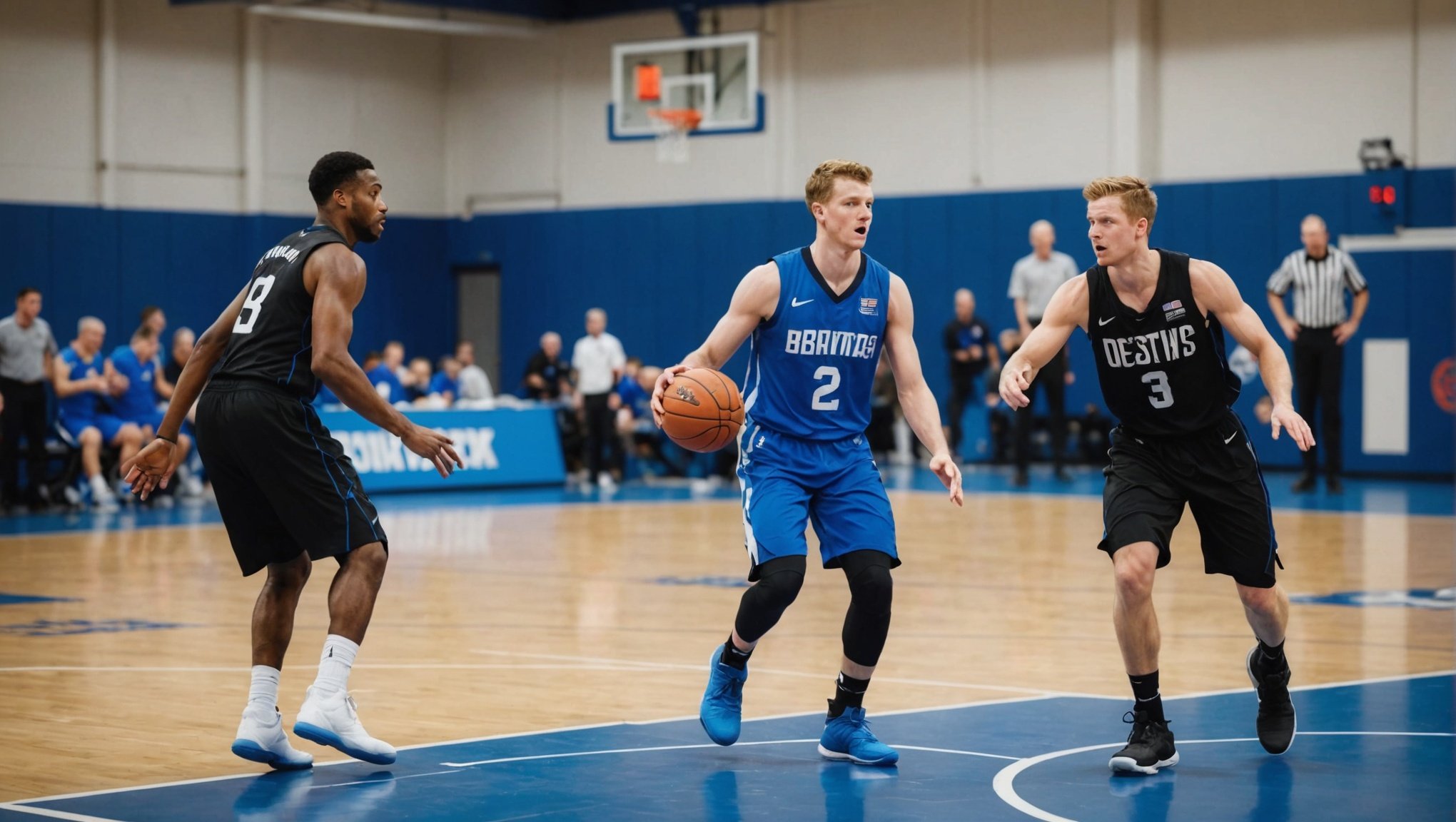Importance of Recovery for Basketball Players
Recovery is crucial in enhancing basketball performance. Players undergo intense physical activity, which leads to both physical and mental fatigue. Emphasising effective recovery methods can significantly improve their overall athletic capability. Proper recovery allows muscles to regenerate and adapt, resulting in better performance in subsequent games.
After games, basketball players often experience physical strains like muscle soreness and injuries. Mentally, the stress of competition can lead to fatigue. Addressing these issues through a structured recovery strategy is essential for maintaining player well-being. Methods such as rest, hydration, and targeted exercises help mitigate these strains and ensure players are ready for future challenges.
Have you seen this : Top Mobile Apps to Boost Basketball Training for Players in the UK
The link between effective recovery and long-term player health cannot be underestimated. Players who consistently invest in their recovery are less likely to face chronic issues and can maintain peak performance over a longer period. By prioritising recovery, athletes not only protect their immediate performance but also their future health. Recovery, therefore, is not just about bouncing back after a game; it’s about ensuring longevity and well-being throughout a player’s career. Leveraging cutting-edge recovery techniques can result in considerable gains in both individual and team success.
Hydration Strategies Post-Game
Understanding the importance of hydration after a basketball game is crucial for optimal recovery and performance. Following a game, basketball players should aim for a fluid replacement strategy that replenishes fluids lost during exertion. Typically, athletes are advised to drink about 1 to 1.5 litres of fluids for each kilogram of body weight lost.
Also read : Essential Post-Game Stretching Routines for UK Basketball Players: Boost Recovery and Minimize Injury Risk
Signs of dehydration can significantly impact an athlete’s performance, causing symptoms such as fatigue, muscle cramps, and reduced coordination. These symptoms undercut players’ ability to perform at their best, making timely rehydration essential.
When comparing water vs. electrolyte drinks for recovery, both have their merits, yet they serve slightly different purposes. Water is excellent for overall hydration; however, electrolyte beverages replenish not only fluids but also essential salts like sodium and potassium lost through sweating. These electrolytes are critical in maintaining fluid balance and preventing cramps.
To effectively implement a recovery protocol, players might consider alternating between water and an electrolyte-rich drink, especially after intense physical exertion. This strategy ensures a well-rounded approach to rehydration, safeguarding the athlete’s health and readiness for upcoming training or games.
Nutrition for Optimal Recovery
Understanding nutrition is crucial for post-game recovery, especially in a high-energy sport like basketball. When it comes to energy replenishment, focus on consuming carbohydrates and proteins. Carbohydrates help restore glycogen levels, while proteins aid in muscle repair.
Recovery foods should be rich in these nutrients. For instance, a bowl of oatmeal topped with fruits provides both carbs and micronutrients. Similarly, grilled chicken with roasted vegetables offers lean protein coupled with vitamins. Consuming a protein shake within 30 minutes post-game can also be beneficial for muscle recovery.
Ideal Meals and Snacks
- Carbohydrate-rich options: Whole-grain pasta with tomato sauce, banana smoothies, and quinoa salads.
- Protein-packed choices: Turkey sandwiches, Greek yogurt with berries, and eggs on whole grain toast.
The Significance of Timing
Timing plays a pivotal role in post-game nutrition. To maximise recovery, aim to eat a balanced meal or snack within the first hour after a game. This period is known as the anabolic window, where nutrients are absorbed most efficiently. Preparing your meals in advance ensures you’re ready to refuel and recover.
Importance of Stretching and Foam Rolling
After a gruelling basketball game, the benefits of stretching are manifold. Notably, static and dynamic stretching can be invaluable post-game. Static stretching involves holding a muscle in a fixed position for a period, ensuring the muscle elongates and improving flexibility. On the other hand, dynamic stretching consists of active movements that help increase the heart rate and prime the body for post-game activities, helping reduce the risk of injury.
Foam rolling is another effective method for muscle recovery. By applying pressure on specific body points, it aids in breaking down muscle knots and enhances blood flow, which is essential for reducing soreness and improving tissue recovery. This process, sometimes referred to as self-myofascial release, is especially beneficial for athletes who demand a lot from their bodies.
For basketball players, a targeted routine tailored to the sport’s demands can significantly aid recovery. Recommended practices include focusing on the hip flexors, quadriceps, and hamstrings, given their frequent use during gameplay. Combining these techniques can lead to improved flexibility, quicker recovery times, and enhanced overall performance on the court.
Sleep and Recovery: The Overlooked Factor
Sleep quality plays a crucial role in athletic performance, impacting everything from physical endurance to mental acuity. For basketball players, achieving optimal recovery sleep is paramount. Quality sleep not only aids muscle recovery but also enhances cognitive functions vital for strategic plays and reaction times.
One common challenge players face is irregular sleep patterns due to varying game schedules. To combat this, maintaining a consistent sleep routine—even on off days—can significantly improve recovery sleep. Creating a relaxing pre-sleep environment, such as minimizing screen exposure and ensuring a comfortable sleeping area, is also beneficial.
Incorporating relaxation techniques, like deep breathing or meditation, can further boost sleep quality. These methods help manage stress and prepare the body for rest. Addressing environmental factors, such as noise and light, is equally important. Basketball players often travel across time zones, disrupting their natural sleep cycles. In these cases, gradually adjusting the sleep schedule before travel or using sleep masks can be effective solutions.
Ultimately, prioritizing sleep allows athletes to enhance their performance and extend their careers. By understanding and addressing these challenges, players can harness the full benefits of restorative sleep for improved performance on the court.
Real-Life Examples and Testimonials
In the world of UK basketball, player testimonials highlight the crucial role recovery practices play in maintaining performance levels and longevity. Take Olivia, a professional player who prioritizes Advanced Muscle Recovery Therapy as a post-game ritual. Her personal experience serves as an inspiration for many, showcasing how integrating recovery strategies helped her reduce injury occurrences and optimise performance.
Professional basketball players in the UK often engage in a variety of recovery strategies. Techniques such as cryotherapy, compression garments, and yoga are common, enabling athletes to rejuvenate their bodies effectively. These strategies are not just habits but foundational aspects of their training routines.
Coaches also share valuable insights about the significance of recovery. Coach Ryan, with over two decades of experience, emphasizes, “Recovery is not optional. It’s a necessity that enhances not only physical health but also mental sharpness.” His testimonial underscores a simple truth, mirrored by athletes and trainers alike: recovery is indispensable for sustainable athletic success.
Such success stories and personal experiences serve as vivid examples, encouraging both aspiring and seasoned athletes to incorporate comprehensive recovery practices into their routines. Recovery isn’t merely an afterthought; it is a vital element in the athletic journey.
Addressing Recovery Challenges
Basketball players often encounter common obstacles when it comes to effective recovery. These obstacles include muscle fatigue, mental stress, and maintaining consistency in recovery routines. Recovery challenges can lead to prolonged downtimes and affect a player’s overall performance if not addressed properly.
To tackle these recovery challenges, players should embrace tailored strategies that cater to their individual needs. A common strategy is ensuring physical rest which allows the body to repair itself. Incorporating mental rest, such as meditation or light activities, helps relieve stress and improve mental resilience. Nutrition also plays a pivotal role; a balanced diet rich in proteins and essential nutrients supports muscle recovery and energy replenishment.
Integrating recovery practices into a player’s routine is crucial. Players should prioritize specific times for cooldown exercises and stretching after training or games. Implementing a structured schedule allows consistent recovery, making it an essential part of daily activity rather than an afterthought. Adapting to these changes encourages players to manage their recovery effectively, enhancing their ability to cope with the demands of the sport. Through player adaptation, athletes can successfully navigate recovery challenges and sustain peak performance.
Expert Tips for Incorporating Recovery Strategies
In sports, recovery is just as crucial as training, ensuring athletes sustain peak performance. Expert advice highlights consistent post-game recovery as vital for long-term success. Professionals recommend a balance of rest and recovery techniques tailored to individual needs. Among these are cooldown exercises and hydration, which reduce injury risk and improve overall well-being.
Coaches play an influential role in incorporating recovery integration strategies within team settings. Their coaching insights not only provide structure but also keep teams motivated to sustain recovery routines. By fostering an environment that values rest, players are more likely to engage in effective recovery practices, leading to improved performance and team success.
Developing a personalised recovery plan with input from experts ensures each athlete receives a recovery strategy that aligns with their unique physiological and psychological needs. This involves understanding one’s body and consulting with trainers and medical professionals to optimise recovery schedules. Involving experts aids in identifying the best modalities, whether it’s hydrotherapy, massage, or sleep optimisation, to fit an athlete’s specific demands.
Expert guidance empowers athletes to consistently integrate recovery practices into their routine, crucially enhancing performance sustainability over time.






